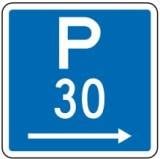You're not allowed to park on a broken yellow line
1m gives vehicles space to turn out of and into the entrance, but the distance you must leave while parked varies if there is an intersection, fire hydrant or bus stop.
Six metres or more is the distance you should park from an intersection unless there are parking bays marked.
Only buses can stop in a bus stop. You may be fined if you stop in a bus stop.

The number on the sign indicates how long you can park there in minutes, and the arrow indicates the direction you can park in.
This sign doesn't specify it's only commercial goods vehicles that can use the space. It is for quick unloading rather than longer term parking and as long as the loading is continuing and the vehicle is attended it can remain in the car park for more than 5 minutes. If the sign said '5 MIN MAXIMUM' then the vehicle would have to be moved within 5 minutes.
You must not stop here between the times shown on the sign. If you do, your car may be towed away. You will have to pay a tow fee to get your car back.
You must park six metres or more away from the approach side of a crossing if there are no broken yellow lines.
Please select 3 correct answers
The road code says you should turn your wheels towards the kerb and leave it in reverse or park. If the park brake fails then the car will run forwards only slightly before hitting the kerb, where it will hopefully stop. You should have your handbrake on while parked as well, although the Road Code doesn't specifically say this.
The side of the road you are on is based on which direction you are facing in relation to which lane you are in. You must never park on the right so that you are facing traffic.
This sign marks the end of a no-stopping zone or clearway.